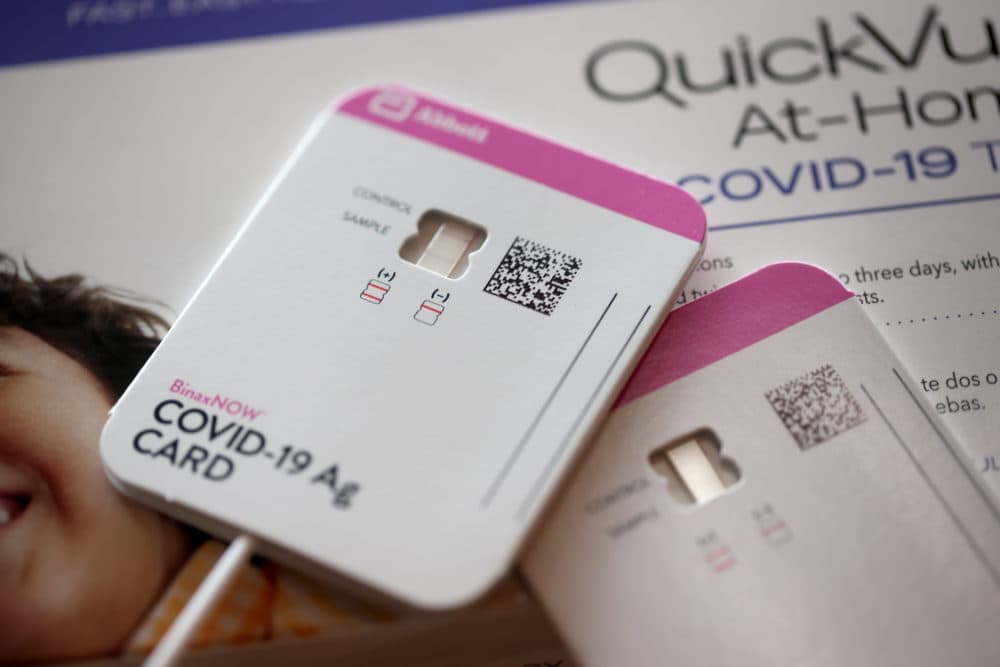Advertisement
Coronavirus Coverage
After a lull, COVID is creeping up again in Mass.

The coronavirus is on the rise again in Massachusetts, reaching its highest levels in many months.
The amount of virus in Boston-area wastewater has increased since late June. And new state data shows the rate of people testing positive for COVID-19 is 9%, the highest point in six months — and that doesn’t account for rapid tests taken at home.
Overall, this uptick remains far below previous waves of COVID.
“Things are changing, but they're still at a very low level,” said Dr. Shira Doron, hospital epidemiologist at Tufts Medical Center.
Experts say for most people, the virus is no longer as severe as it used to be, because of widespread immunity from vaccinations and prior infections, and the availability of treatments that can help prevent serious illness.
“We need to look at COVID in the context of all of the respiratory viruses,” Doron said. “Most people now will handle COVID with minimal adverse outcomes.”
Hospitalizations have increased gradually, to more than 200 COVID-positive patients in Massachusetts hospitals last week. But less than a quarter of them were being treated primarily for COVID; the majority were admitted for other reasons.
The percentage of seriously ill COVID patients has been shrinking over time.
In recent days, Tufts Medical Center typically has had three or fewer COVID inpatients at a time, Doron said, a significant change from past surges, when COVID was a strain on staff and hospital beds were in short supply.
At Mass General Brigham, the state’s largest hospital system, about 50 admitted patients have COVID this week, but only two are sick enough to require intensive care, said Dr. Paul Biddinger, the chief preparedness and continuity officer.
Advertisement
“Mass General Brigham has seen a slow rise in the percent positivity of COVID testing and hospitalizations since early July, when we were close to our lowest values … since the pandemic began,” Biddinger said by email. “The rate of rise seems to have been leveling off in the past few days, but it is too early to draw any conclusions from the data yet.”
COVID hospitalizations are increasing nationwide, according to the Centers for Disease Control and Prevention. But the levels remain low overall in more than 99% of the country. The level of virus in wastewater has been rising nationally, too.
COVID levels are expected to fluctuate over time, though its ebbs and flows have not followed a predictable pattern thus far.
The current uptick may be driven by a combination of factors, including the gradual rise of a virus subvariant, EG.5, and waning protection from past vaccinations, experts said. Also, people may be spending more time indoors to escape the heat and rain. The virus spreads more easily indoors.
“I'm concerned about what's going on right now,” said Dr. David Hamer, professor of global health at Boston University. “I'm curious to see if this continues.”
“As we get into October, November, when it's cooler and we have to be inside, will it worsen then? Or are we going to just see a little wave that trickles off?" he said. "It's really been hard to predict what's going to happen.”
Hamer said people at higher risk of getting sick from COVID, including those who are older or have medical conditions that weaken their immune system, should consider wearing masks in public places for now.
“Anybody who is at high risk themselves, or is living with a high-risk family member, needs to be very cautious over the next few weeks as we watch this,” he said.
This is the first uptick since the end of the COVID public health emergency in May, which came more than three years after the start of the pandemic. That milestone marked the end of free COVID tests for many people, and the end of universal masking in Massachusetts health care facilities.
So far, the state Department of Public Health is not planning any change to COVID policies.
“While we are seeing increases in COVID-19 activity, including hospitalization, we have the tools to manage COVID-19 in Massachusetts — including vaccines, treatments, and tests — and the benefit of widespread immunity from vaccination and prior infection,” department spokesperson Ann Scales said in an email.
State health officials said they have a stockpile of rapid COVID tests that can be deployed if needed, but they have not explained what would prompt them to distribute the tests.
Public officials and doctors also recommend staying up to date on COVID vaccinations, though a newer formulation of the booster shot is not yet available.
